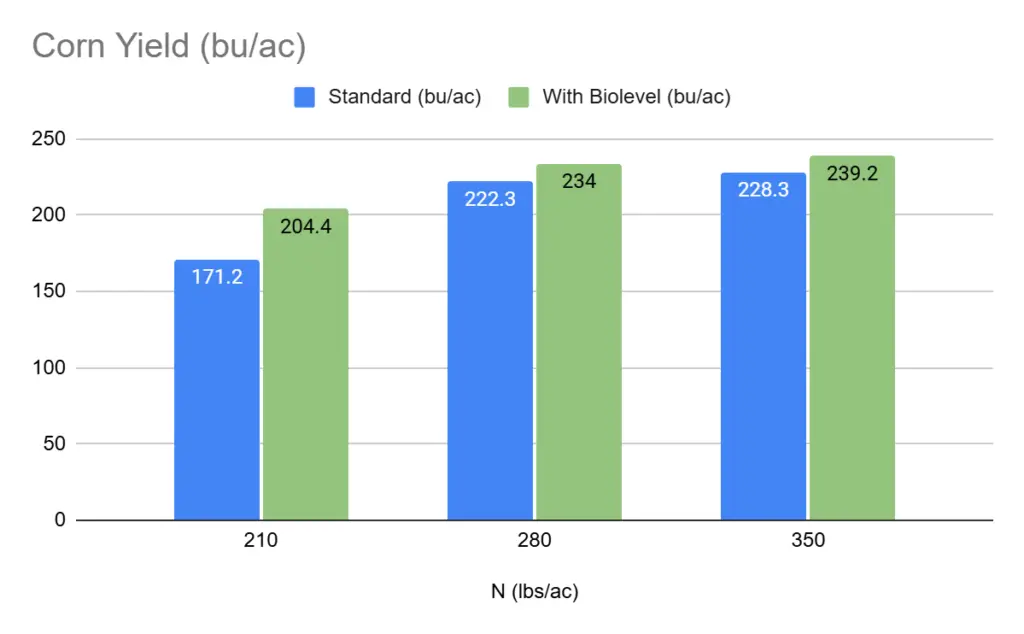Using soil biology to cycle nutrients effectively for crop use could hold the key to reducing fertilizer requirements and the consequent impact on the environment.
In the fight against climate change, optimizing the use of synthetic fertilizers is a key target for farmers, government and environmentalists. This can be achieved by maintaining yield at reduced fertilizer rates, or by achieving a higher yield at standard fertilizer rates.
The problem with non-organic agricultural fertilizers
Commercial agricultural fertilizers contain high levels of synthetic nitrogen and phosphorus, both of which may have negative impacts on water quality and biodiversity.
While nitrogen is essential for plant growth and ultimately crop yields, synthetic nitrogen fertilizers are a major contributor to climate change. The manufacture of synthetic nitrogen is energy-intensive, resulting in high greenhouse gas emissions while the use of synthetic nitrogen in agriculture emits nitrous oxide – a potent and long-lived greenhouse gas.
Phosphate is essential for plant growth but is a finite resource that is increasingly mined in regions where social concerns are numerous.
The growing interest in bionutrition
Concerns around non-organic fertilizers have resulted in regulatory and public pressure to seek alternatives to synthetic fertilizer use. For farmers, fertilizers are an expensive input, albeit one with the potential to produce a large return on investment. Synthetic fertilizer application is often inefficient, so the potential to reduce fertilizer use while accessing more efficient application methods offered by biological products represents a major win-win, both for farmers, and for the environment.
Similarly, while it is common for levels of plant-available forms of phosphorus to be below the required values in soils, those same soils hold significant volumes of ‘locked up’ phosphorus bound to calcium, aluminium or iron (depending on the pH value of the soil). By making these huge soil reserves available through the use of biological soil nutrition, there is the potential to reduce the application of phosphorus or increase the efficiency of applied P fertilizer.
However, this is not an easy balance to achieve.
How microbial products could reduce fertilizer use
One solution is to make better use of soil biology. Contained within the billions of different microbes in our soil are species that can help either fix atmospheric nitrogen, or successfully solubilize locked up phosphorus reserves.
Biolevel products contain both these types of microbes, and our trials are demonstrating the potential of using such products for building healthier soils while delivering yield improvements and reducing the quantity of fertilizer growers have to apply.
Biolevel case studies:
Biolevel University of Florida trial on corn
The University of Florida, sponsored by the Environmental Protection Agency, assessed the potential of Biolevel’s MaizeNP to reduce nitrogen fertilizer use. Preliminary findings from the first year of this multi-year study indicated that MaizeNP significantly increases corn yields at all nitrogen levels tested. In 2023, the results showed two benefits for farmers:
- Achieving higher yields at standard nitrogen rates or maintaining yields with reduced nitrogen levels. Specifically, when MaizeNP was used with a full nitrogen rate of 350 lbs/acre, yields increased by 10.9 bushels per acre.
- Reducing nitrogen from 350 lbs/acre to 280 lbs/acre still yielded 5.7 bushels per acre more with Biolevel than without.

Biolevel trials on wheat and barley
Biolevel’s GramaxNP, a microbial liquid seed coating for small grains like wheat and barley, optimizes nitrogen fertilizer use. Trials by independent research organizations have consistently shown that GramaxNP increases yields beyond full nitrogen rates. After years of success in maintaining yields with 20% less nitrogen, 2024 trials demonstrated that yields can be sustained with a 30% reduction in nitrogen.
By enhancing soil biology to cycle nutrients more effectively, synthetic fertilizer use becomes more efficient, benefiting both yields and the environment.
Biolevel Distributor Certis Belchim showcasing the positive effects of Biolevel GramaxNP on small grains.
Talk to us about how Biolevel’s biological products can help you improve the condition of your soil and increase crop yields with ease and convenience. Call Josh Seeman +1 904 657 0316 or email. Interested in becoming a Biolevel distributor? We'd love to talk to you too!

